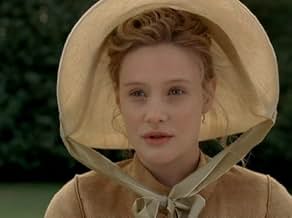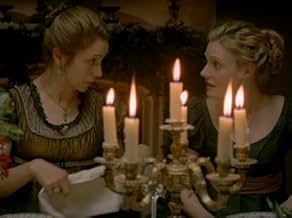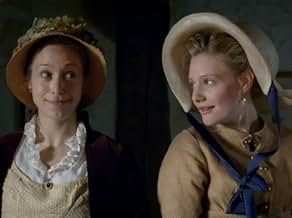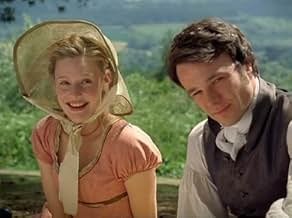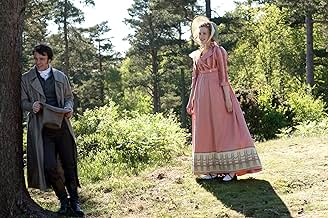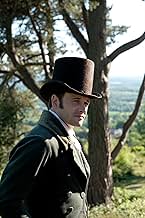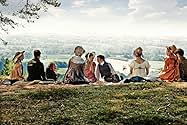Emma Woodhouse parece perfeitamente satisfeita por ter um pai amoroso com quem se importa, amigos e um lar. Mas Emma tem um péssimo hábito: ser casamenteira.Emma Woodhouse parece perfeitamente satisfeita por ter um pai amoroso com quem se importa, amigos e um lar. Mas Emma tem um péssimo hábito: ser casamenteira.Emma Woodhouse parece perfeitamente satisfeita por ter um pai amoroso com quem se importa, amigos e um lar. Mas Emma tem um péssimo hábito: ser casamenteira.
- Ganhou 1 Primetime Emmy
- 1 vitória e 9 indicações no total
Explorar episódios
Avaliações em destaque
There is a clichéd version of Period and Regency characters which grew up in the 1920's and 1930's fostered by UK and US film studios with straight backs, ironed crinolines, stiff upper lips and emotionally strangled dialogue from which a number of recent adaptations have dared to depart.
Sometimes, as in the case of 1999 Mansfield Park, adapters and cast have departed for the hills and created something so far off Austen's wavelength that it might be a prequel for the Pirates of The Caribbean franchise. Enjoyable perhaps. But not MP.
That's not what we have here. What we have here is something that is entirely on Austen's wavelength, with characters behaving as her characters would and saying the sorts of things her characters say. Something which is faithful to the purpose and meaning of the book, which aims to get the characters Jane Austen wrote onto the screen where we can see, recognise and enjoy them. This series is triumphantly successful at doing just that, partly owing to the care that has been taken with the script and partly due to the outstanding performances of the leads.
It built on a wonderfully realistic foundation of what love, loss and family all mean. If it did, perhaps, labour the point a bit at the beginning, there were superb contrasts between where Emma's life was full and empty. Her lack of self knowledge, her yearning for companions and challenges worthy of her sense and intelligence clearly illustrated the traps she made for herself.
And whilst we follow the progression of their relationship from Knightley's point of view more than the book warrants, Emma's bursting discovery of her love for him is actually dramatised here just as Austen wrote it, not watered down by injections of artificial chemistry between the lead actors.
I think there are lots of people who could turn out an Emma adaptation like the two films from the 90's. This version set itself the much harder task of adapting the book (as Clueless did) rather than just animating selected bits and stringing them together. And it succeeds. The reason Garai's Emma is different to all the others is that Garai is playing the character Jane Austen wrote and Sandy Welch, as she did with Jane Eyre, got her onto the screen by dramatically recreating her rather than transposing her dialogue into a screenplay.
There are, of course, unnecessary departures from the canon. Perhaps it is highly unlikely that Emma would have allowed Knightley to kiss her within sight of the house, or that Knightley would have forgotten himself that far either. However, were they sure of being unobserved, I think Emma and Frank would have been perfectly capable of shocking even modern dowagers with a passion that is written carefully into the novel but seldom gets up onto the screen. If I was servant at Hartfield, I'd be very careful to make them aware of my presence outside the bedroom door before taking their morning tea in.
I had my reservations about this adaptation at first but having watched it more times than I now care to admit, I cannot now name a better Austen adaptation. I think the unusual start was a gamble designed to illustrate the insecurity of early 19C family life to newcomers and wilfully detach dedicated Austen fans from their comfort zone from the opening seconds, both of which worked triumphantly. It instantly drew parallels between the lives of Emma, Jane and Frank (and, more subtly, Harriet) which are at the core of the book and completely absent from any other adaptation. A very, very clever trick for which some purists have yet to forgive her. Not this one, however. Once you have adjusted your goggles, this adaptation hits new heights for the whole genre and becomes an unalloyed pleasure.
It's beautifully shot, all the characterisations are incredibly detailed, even minor characters like John Knightley and Mrs Goddard are fully realised and Garai and Miller hit their top notes reliably again and again.
I'm sure Austen would love it.
Sometimes, as in the case of 1999 Mansfield Park, adapters and cast have departed for the hills and created something so far off Austen's wavelength that it might be a prequel for the Pirates of The Caribbean franchise. Enjoyable perhaps. But not MP.
That's not what we have here. What we have here is something that is entirely on Austen's wavelength, with characters behaving as her characters would and saying the sorts of things her characters say. Something which is faithful to the purpose and meaning of the book, which aims to get the characters Jane Austen wrote onto the screen where we can see, recognise and enjoy them. This series is triumphantly successful at doing just that, partly owing to the care that has been taken with the script and partly due to the outstanding performances of the leads.
It built on a wonderfully realistic foundation of what love, loss and family all mean. If it did, perhaps, labour the point a bit at the beginning, there were superb contrasts between where Emma's life was full and empty. Her lack of self knowledge, her yearning for companions and challenges worthy of her sense and intelligence clearly illustrated the traps she made for herself.
And whilst we follow the progression of their relationship from Knightley's point of view more than the book warrants, Emma's bursting discovery of her love for him is actually dramatised here just as Austen wrote it, not watered down by injections of artificial chemistry between the lead actors.
I think there are lots of people who could turn out an Emma adaptation like the two films from the 90's. This version set itself the much harder task of adapting the book (as Clueless did) rather than just animating selected bits and stringing them together. And it succeeds. The reason Garai's Emma is different to all the others is that Garai is playing the character Jane Austen wrote and Sandy Welch, as she did with Jane Eyre, got her onto the screen by dramatically recreating her rather than transposing her dialogue into a screenplay.
There are, of course, unnecessary departures from the canon. Perhaps it is highly unlikely that Emma would have allowed Knightley to kiss her within sight of the house, or that Knightley would have forgotten himself that far either. However, were they sure of being unobserved, I think Emma and Frank would have been perfectly capable of shocking even modern dowagers with a passion that is written carefully into the novel but seldom gets up onto the screen. If I was servant at Hartfield, I'd be very careful to make them aware of my presence outside the bedroom door before taking their morning tea in.
I had my reservations about this adaptation at first but having watched it more times than I now care to admit, I cannot now name a better Austen adaptation. I think the unusual start was a gamble designed to illustrate the insecurity of early 19C family life to newcomers and wilfully detach dedicated Austen fans from their comfort zone from the opening seconds, both of which worked triumphantly. It instantly drew parallels between the lives of Emma, Jane and Frank (and, more subtly, Harriet) which are at the core of the book and completely absent from any other adaptation. A very, very clever trick for which some purists have yet to forgive her. Not this one, however. Once you have adjusted your goggles, this adaptation hits new heights for the whole genre and becomes an unalloyed pleasure.
It's beautifully shot, all the characterisations are incredibly detailed, even minor characters like John Knightley and Mrs Goddard are fully realised and Garai and Miller hit their top notes reliably again and again.
I'm sure Austen would love it.
10kaaber-2
- not that there's anything the matter at all with the two 1996 versions of Austen's novel or their two Emmas, Gwyneth Paltrow and Kate Beckinsale, but I think that Romola Garai releases an Emma that's perfect: her obtuseness as far as the hearts of others are concerned is matched perfectly with the special kind of air-headed charm that Garai delivers (so very far from the sensible Cordelia she delivered in Ian McKellen's "King Lear"). Paltrow was beautiful, Beckinsale sweet, but Garai manages an Emma who seems unaffectedly oblivious to her own beauty and sweetness and only strives to do right by others – and fails. This appears to me to be the essence of the character that is the most fallible of Austen's heroines, with the possible exception of Catherine Morland in "Northanger Abbey." But apart from that, the scenes between Garai's Emma and Jonny Lee Miller's Mr. Knightley are electrifying. Especially their argument after Emma has talked Harriet Smith into rejecting Knightley's champion, Robert Martin. Miller's Knightley doesn't just correct Emma with a wish to render her a more blameless person – this Knightley truly enjoys his rows with Emma, without knowing it himself, of course: that clearly comes across.
The fact that the Director O'Hanlon has been extremely aware of every opportunity of non-verbal communication where the camera studiously catches every frown, every half-smile, every twinkling of an eye makes this version a pure delight to watch from beginning to end.
It's lovely.
I was kind of dreading this, but it is now my favorite Emma adaptation. Much better than either the Paltrow or the Beckinsale version.
Romola Garai was as close to perfect an Emma as I could imagine. Jonny Lee Miller was an excellent Mr. Knightley. I adore Jeremy Northam but really he was almost too dishy to be a credible Knightley. With Northam around how could Emma ever think herself in love with anyone else? With Miller, Knightley became a more credible character -- that pleasant, cultivated, somewhat older man from next door that Emma had known all her life and never realized she loved because she was so used to him.
Michael Gambon was wonderful as Emma's father. He is easy to overplay to comic effect for his idiosyncrasies -- a foolish, fussy hypochondriac. With Gambon, he was more nuanced -- his fear of illness and accident was understandable (people did die of such things a lot in the 18th century, and he had lost his wife in tragic circumstances). He seemed genuinely loving of Emma, not just exploiting her as a dutiful daughter. You could understand why Emma was genuinely fond of him.
The rest of the cast was also excellent and the English countryside never looked so gorgeous.
There were some smallish glitches. I am quite sure, for example, that Frank Churchill would never have sprawled on the ground with his head on Emma's lap, as he did in the Box Hill scene. All Highbury would have been shocked.
Romola Garai was as close to perfect an Emma as I could imagine. Jonny Lee Miller was an excellent Mr. Knightley. I adore Jeremy Northam but really he was almost too dishy to be a credible Knightley. With Northam around how could Emma ever think herself in love with anyone else? With Miller, Knightley became a more credible character -- that pleasant, cultivated, somewhat older man from next door that Emma had known all her life and never realized she loved because she was so used to him.
Michael Gambon was wonderful as Emma's father. He is easy to overplay to comic effect for his idiosyncrasies -- a foolish, fussy hypochondriac. With Gambon, he was more nuanced -- his fear of illness and accident was understandable (people did die of such things a lot in the 18th century, and he had lost his wife in tragic circumstances). He seemed genuinely loving of Emma, not just exploiting her as a dutiful daughter. You could understand why Emma was genuinely fond of him.
The rest of the cast was also excellent and the English countryside never looked so gorgeous.
There were some smallish glitches. I am quite sure, for example, that Frank Churchill would never have sprawled on the ground with his head on Emma's lap, as he did in the Box Hill scene. All Highbury would have been shocked.
With the enduring interest in the novels of Jane Austen, an author eons ahead of her time as far as writing stories that dealt with women's view of the world, it is not unexpected that the film makers repeat versions of these rollicking tales. This may be the fourth or so version of EMMA and for this viewer it is the most successful. A large part of the success of this version of the novel is both the screenplay by Sandy Welch and the direction by Jim O'Hanlon who elect to open the graphic gates of Highbury with a sequence that shares with the audience the background of the diaspora of the children whose parents have died and whose lives will eventually come together as adults. It works very well in setting the scene and the mood of class distinction so prevalent in England of the period.
Emma is brought fully to life by Romola Garai and this role further establishes her as one of the more important character actresses on film. The remainder of the cast is perfectly balanced, with Michael Gambon as Emma's ever needy father, Jonny Lee Miller as the perfect Mr. Knightley, Lousie Dylan as the ditsy Harriet Smith, Tamsin Grieg as the hilariously boring and mouthy Miss Bates, the striking Blake Ritson as the vicar Mr. Elton, talented Laura Pyper as Jane Fairfax, and Jodhi May as the governess turned neighbor Anne Taylor. The ensemble casting is as fine as any of the Austen transitions to the visual and the cinematography and costumes are first class.
The words may not all belong to Jane Austen (Sandy Welch has introduced some very apropos new lines), but the feel of the novel would likely please the author as much as it pleases the audience. The 4 episode BBC production comes in two CDs and the quality of production is superb. In every way, this EMMA is a joy.
Grady Harp
Emma is brought fully to life by Romola Garai and this role further establishes her as one of the more important character actresses on film. The remainder of the cast is perfectly balanced, with Michael Gambon as Emma's ever needy father, Jonny Lee Miller as the perfect Mr. Knightley, Lousie Dylan as the ditsy Harriet Smith, Tamsin Grieg as the hilariously boring and mouthy Miss Bates, the striking Blake Ritson as the vicar Mr. Elton, talented Laura Pyper as Jane Fairfax, and Jodhi May as the governess turned neighbor Anne Taylor. The ensemble casting is as fine as any of the Austen transitions to the visual and the cinematography and costumes are first class.
The words may not all belong to Jane Austen (Sandy Welch has introduced some very apropos new lines), but the feel of the novel would likely please the author as much as it pleases the audience. The 4 episode BBC production comes in two CDs and the quality of production is superb. In every way, this EMMA is a joy.
Grady Harp
Brilliant! Everything from the acting, the costumes, storyline, and music was just so superbly done. This version of Emma far surpasses its predecessors. Romola, actress staring as Emma, puts Pultrow to shame.
This movie sets itself apart from other versions of Emma. The storyline is very much dictated by the actual book. The actors and actresses really captured the characters in the story; it made all the difference in being able to identify and understand the characters.
Also, the setting and costumes they chose really captured the times. The color palate was sensational.
If you are a true Jane Austen fan, you will love this film. It is a must for your Austen collection!! WELL DONE!!
This movie sets itself apart from other versions of Emma. The storyline is very much dictated by the actual book. The actors and actresses really captured the characters in the story; it made all the difference in being able to identify and understand the characters.
Also, the setting and costumes they chose really captured the times. The color palate was sensational.
If you are a true Jane Austen fan, you will love this film. It is a must for your Austen collection!! WELL DONE!!
Você sabia?
- CuriosidadesIn 1995, BBC had already commissioned Sandy Welch to write the script for an "Emma" mini-series. However, since Miramax and also Meridien were producing their own movies for cinema and television, respectively, the BBC canceled its own project. One decade later, the production was revived.
- ConexõesFeatured in The 62nd Primetime Emmy Awards (2010)
Principais escolhas
Faça login para avaliar e ver a lista de recomendações personalizadas
- How many seasons does Emma have?Fornecido pela Alexa
Detalhes
- Data de lançamento
- País de origem
- Centrais de atendimento oficiais
- Idioma
- Também conhecido como
- 艾瑪
- Locações de filme
- Loseley Park, Guildford, Surrey, Inglaterra, Reino Unido(Donwell Abbey, Mr Knightley's estate)
- Empresa de produção
- Consulte mais créditos da empresa na IMDbPro
Contribua para esta página
Sugerir uma alteração ou adicionar conteúdo ausente




